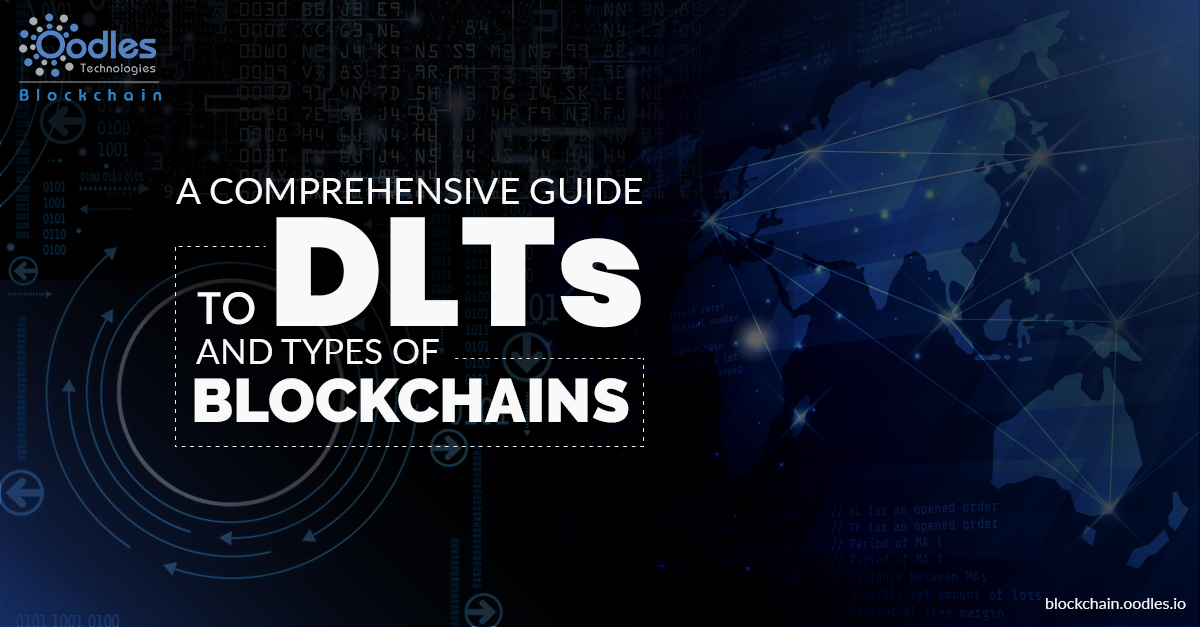-
In this blog, we have outlined an overview of DLTs (distributed ledger technologies) and types of blockchains to help you understand certain distinctions and technicalities of them, that sets them apart from each other. It will help in determining the right platform for your blockchain application development on a global scale.
Distributed Ledger Technology (DLT)
An idea took birth after the unprecedented rise and fall of Bitcoin in the last few years. One can use the Bitcoin blockchain for various types of value transactions. For that, the Ethereum project developed its blockchain and kept its properties quite different than Bitcoin. They decoupled the smart contract layer from the core blockchain protocol. This offered a radical new method to form online markets and programmable transactions called smart contracts. Private entities like banks thought that they could utilize the core idea of blockchain as a DLT and form a permission (private or federated) blockchain. In a permissioned blockchain, the validator would be a member of a consortium of the same organization. The term blockchain when used within the context of permissioned, private ledgers can be referred to as highly controversial. Thus, the term DLT became a more general title.
Private blockchains can be effective when used for solving security, efficiency, and frauds within a traditional financial entity, however, only incrementally.
Public blockchains hold more potential than private blockchains. Public blockchain can reform the cumbersome functions of traditional financial entities with software, essentially reforming the way the financial system works. Now let's read on to the types of blockchain technology and comprehend the technicalities, advantages, uses, etc. Also, Visit: Distributed Ledger Technology (DLT) for Business Solutions
Types of Blockchains
Public Blockchains
Based on proof-of-work (PoW), state-of-the-art public blockchain protocols are open source and not permissioned. It means that anyone can participate without requiring any permission to join it. They are also one of the most used types of blockchain.
- Anyone can download the source code and run a public node on their local device. Thus verifying transactions in the network as well as participating in the consensus process. Consensus is a method to determine what blocks get added to the chain and what the current state is.
- Anyone in the world can send transactions through the network and the blockchain will include valid transactions.
- Anyone who wants to read transactions can use the public book explorer. Transactions will be transparent and anonymous though.
Examples: Bitcoin, Monero, Dash, Litecoin, Dogecoin, etc. Impacts: Power to bring disruption in existing business models through disintermediation. It eliminates the need to maintain systems or server admins. Thus, it radically reduces the costs involved in developing and running dApps (decentralized applications).
Consortium Blockchain
Consortium or federated blockchains are mainly operated under the leadership of a group. Contrary to public blockchains, they don't permit anyone to join the process of verifying transactions. These blockchains are quicker and offer increased transaction privacy. These blockchains are mostly used to disrupt the banking industry. A pre-selected set of nodes controls the consensus process. For instance, there's a consortium of 15 financial institutions, each of which runs a node and of which 10 must sign every block of information for the block to be verified. The permission to read the blockchain can be public, or limited to participants. Examples: EWF (Energy), R3 (Banks), B3i (Insurance), Corda Impacts: Lowers transaction costs and data anomalies and replaces the traditional systems, streamlining document management and eliminating the semi-manual compliance mechanisms. In this sense, you can consider it equivalent to SAP in the 1990s; lowers costs, but doesn't cause disruption. Check It Out: An Introduction to Corda Blockchain Platform and its Key Concepts
Private Blockchains
In a private blockchain, one central organization allows Write permissions. Example applications include auditing, database management, etc., which are internal to a single company. Therefore, public readability may not be necessary in many cases. Private blockchains are one of the important types of blockchains that take advantage of blockchain technology. It sets up groups and participants who can validate transactions internally. This increases the risk of security concerns alike a centralized system, as opposed to public blockchains. Game-theoretic incentive methods secure these networks. However, businesses prefer private blockchains when it comes to scalability and state compliance with data privacy regulations and other regulatory matters. Examples: MONAX, Multichain Effects: Alike the consortium blockchain, a private blockchain can help reduce transaction costs and data anomalies. It can also replace traditional systems, streamlining document management and eliminating the need for semi-manual compliance mechanisms. In that sense, you can consider it equivalent to SAP in the 1990s; lowers costs, but doesn't cause disruption. Suggested Read: Hybrid Blockchain: Converging Public and Private Blockchains
Conclusion
To sum it up, different types of blockchains have different functionalities that make them ideal for specific uses. For instance, private businesses can opt for private blockchain to safely store their store. So, one can choose a blockchain on the basis of the requirements. If you are interested in developing a blockchain solution for your business, then Oodles can assist you. Contact our blockchain developers to get started.

Our Offices
INDIA
Emaar Digital Greens, Sector 61,
Gurugram, Haryana
122011.
Welldone Tech Park,
Sector 48, Sohna road,
Gurugram, Haryana
122018.














